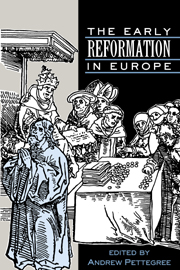1 - The early Reformation in Europe
Published online by Cambridge University Press: 06 January 2010
Summary
Viewed in retrospect it is in the years immediately after Luther first came to prominence as a theological writer that the Reformation appears most harmoniously and coherently international. Luther's writings certainly excited the interest of a wide international public: even the briefest glance at the contemporary comment on the ‘Luther affair’ leaves little doubt of this. Almost from the first months after Luther had begun to achieve notoriety in Germany, reports from across Europe testify to the intense interest aroused in his character, his writings and his fate. Thus, in May 1519, a Swiss student studying in Paris, Peter Tschudi, could note the avidity with which Luther's works were read in the city; even apparently, according to Luther's other correspondents, at the Sorbonne, later the relentless guardian of doctrinal orthodoxy. In Holland and Flanders meanwhile, much of the intellectual community seemed to have been caught up in the new controversies, as the correspondence of Erasmus bears sufficient testimony. It was probably from the Netherlands that numbers of Luther's works were also transported across the Channel to England, where they are known to have been read about this time. The scale of the intellectual interest in Luther's writings is captured in a famous letter to the reformer by the Swiss publisher Johannes Froben, who in February 1519 was in the process of publishing his second collected edition of Luther's Latin works. Froben wrote to Luther that he had despatched some 600 copies of this collection to France and Spain, and further consignments to England, Italy and the Netherlands.
- Type
- Chapter
- Information
- The Early Reformation in Europe , pp. 1 - 22Publisher: Cambridge University PressPrint publication year: 1992



